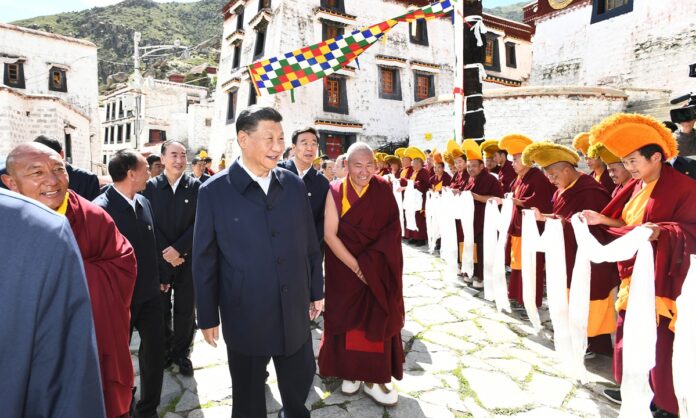(TibetanReview.net, Oct09’21) – In the name of “deepening the progress of ethnic unity in education,” the Communist Party of China has moved subtly but decisively to make cultural assimilation the central tenet of its policy for managing minority populations nationwide, beginning with Sinicizing the education policy, reported the wsj.com Oct 8. The new approach also envisages more ethnic Chinese – the so-called Han Chinese – being encouraged to move to ethnic minority areas.
The report said quiet changes to education policy as well as personnel in minority regions followed President Xi Jinping’s call for forging of a “collective consciousness.”
An updated blueprint for childhood development released last week had quietly scrapped wording that guaranteed the rights of minority children to be educated in their native language. In its place is a new line calling for greater emphasis on the teaching of the national language with an eye toward “deepening the progress of ethnic unity in education,” the report said.
The change followed a meeting of senior officials in Beijing to discuss ethnic policy in late August, where party leaders accepted the new direction for the first time in a formal setting.
Citing China’s official Xinhua news agency, the report quoted Xi as having told the meeting, “To make joint efforts of all ethnic groups to form a modern socialist country is an important aspect on ethnic issues in the new era.” He has said the way to reduce the possibility of ethnic conflict was to take steps to “build up the collective consciousness of the Chinese nation”.
Inspired by the Soviet Union, China has earlier offered nominal political autonomy to minority communities, as well as preferential policies such as extra marks on the country’s competitive college-entry exams and exemptions from family planning rules. However, recent developments indicate that Mr Xi and the party were moving away from that approach more aggressively, the report cited scholars as saying.
James Leibold, a professor who specializes in China’s minorities at La Trobe University in Australia, has said Mr Xi’s speech at the Ethnic Affairs meeting in Beijing in August “marked the formal arrival of the second generation of ethnic policy.”
While the Communist Party earlier believed that minority groups would naturally assimilate if given space and sufficient economic support to attract development with the country’s dominant Han Chinese population, Mr Xi sees this strategy alone as no longer feasible, Leibold has said.
The report cited officials and government advisers as saying Mr Xi was concerned that his goal of completing China’s national rejuvenation by 2049 – the centenary of the country’s founding – could be undermined by ethnic conflict.
The report cited government documents as showing that recent changes to early childhood development guidelines underscored and unified scattered efforts to phase out or reduce the teaching of minority languages in schools—a key element in creating a single national identity.
The new policy also envisages encouraging more ethnic Chinese to work in minority areas of the country. At the same time, preferential policies for ethnic minorities are now gradually being withdrawn, beginning with the stoppage of awarding of extra marks on national competitive exams and the requirement for preschool minority children to be taught in Mandarin instead of their mother tongue.
The report noted that after Mr Xi’s ethnic-affairs meeting in August, the country’s top ethnic-affairs body published a commentary, calling for “creating a collective consciousness of the Chinese nation” that should be channeled through the entirety of the country’s education system.
“It is necessary to promote the wide exchange and integration of all ethnic groups, to promote the unity of all ethnic groups in ideals, beliefs, sentiments and cultures and to support each other and to have deep brotherhood,” Xi was quoted as saying.






